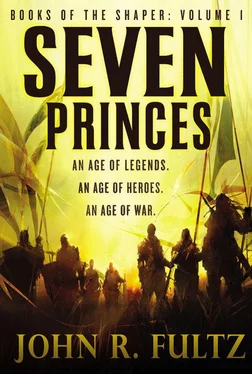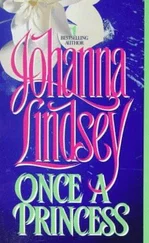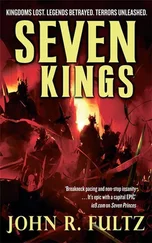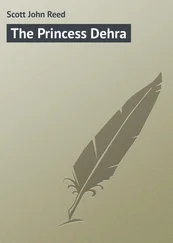John Fultz - Seven Princes
Здесь есть возможность читать онлайн «John Fultz - Seven Princes» весь текст электронной книги совершенно бесплатно (целиком полную версию без сокращений). В некоторых случаях можно слушать аудио, скачать через торрент в формате fb2 и присутствует краткое содержание. Жанр: Фэнтези, на английском языке. Описание произведения, (предисловие) а так же отзывы посетителей доступны на портале библиотеки ЛибКат.
- Название:Seven Princes
- Автор:
- Жанр:
- Год:неизвестен
- ISBN:нет данных
- Рейтинг книги:5 / 5. Голосов: 1
-
Избранное:Добавить в избранное
- Отзывы:
-
Ваша оценка:
- 100
- 1
- 2
- 3
- 4
- 5
Seven Princes: краткое содержание, описание и аннотация
Предлагаем к чтению аннотацию, описание, краткое содержание или предисловие (зависит от того, что написал сам автор книги «Seven Princes»). Если вы не нашли необходимую информацию о книге — напишите в комментариях, мы постараемся отыскать её.
Seven Princes — читать онлайн бесплатно полную книгу (весь текст) целиком
Ниже представлен текст книги, разбитый по страницам. Система сохранения места последней прочитанной страницы, позволяет с удобством читать онлайн бесплатно книгу «Seven Princes», без необходимости каждый раз заново искать на чём Вы остановились. Поставьте закладку, и сможете в любой момент перейти на страницу, на которой закончили чтение.
Интервал:
Закладка:
Lyrilan walked inside, hands clasped at his back, and D’zan followed. His eyes scanned shelves twice the height of his head. Volume upon volume of leather-bound tomes, more than he had ever seen gathered in one place, lined the curving walls. A few bronze statues of legendary scribes, scholars, and heroes stood beneath the dome like burnished pillars. The floor was a collection of wooden tables, padded chairs, smaller shelves for special collections, and stores of ink and quills. D’zan spotted two bald scribes at work, painstakingly creating copies of some elder text, filling the pristine pages with ancient knowledge.
Lyrilan stopped at the very center of the chamber, where the floor tiles were arranged in the image of a great open book, its pages inscribed with holy passages. He turned to look at D’zan, whose eyes were still sweeping over the book-lined walls.
“What do you see?” Lyrilan asked.
“Books…”
“Is that all? Look closer. This is the greatest library in all the Stormlands, possibly in all the world. What do you see?”
D’zan turned his eyes from the books to look at Lyrilan, who stood now with his hands spread like a street magician about to perform a trick. Was this another riddle?
“Knowledge?” he guessed.
Lyrilan clapped his hands together. “Yes, knowledge. Here is knowledge, that’s to be sure. What else?”
D’zan sighed. He should have stayed under the fig tree. Why didn’t these Uurzians speak plainly like good Yaskathans? Ever Skatzanything here was all innuendo and court etiquette. His father had been a warrior first, a King second, and parent third. He had no time for tricky wordplay or men who did not say what they meant openly and clearly. Suddenly he remembered that his father was gone, as if he’d somehow forgotten it. His heart became a lead weight in his chest. He remembered Lyrilan asking about his father.
“History?” D’zan said.
“Indeed,” said Lyrilan. “Knowledge, history… wisdom. The thoughts of the greatest minds of all the ages. The struggles and triumphs, the failures and tragedies, of all the men who walked this earth for eons… they are all here, D’zan, on the pages of these books.”
D’zan watched one of the scribes working carefully with his trembling quill, squinted eyes focused on the patterns of ink he scrawled across the page. The man was oblivious to all else but the page upon which he worked.
“The tales of dead men,” D’zan said. “Of kingdoms fallen to dust… ages that are no more than dreams to us now.”
Lyrilan laughed. “Are they?” he said. “Let me ask you this: how else can a man communicate his hopes, his dreams, his thoughts across the eternal ages? How else can a mind reach through the veil of millennia and touch another mind with understanding? How else but through this glorious invention that we call the written word? It began on stone tablets, then scrolls of papyrus and myra, and finally it takes the form of these wonders… these books. This is the greatest magic of all magics, D’zan. This is immortality.”
“Immortality?” D’zan said. “Only the Gods are immortal.”
Lyrilan slapped him on the shoulder. “Ha! The Gods do not write books, D’zan. Men write books about the Gods! What does this tell you?”
“That Gods are not scribes.”
“The Gods write upon the face of the world itself. They have no need of books. As the Gods write our lives into the world, so we write our lives into these books. We can invent whole new worlds in these books if we wish. Some have…”
“What do you mean?”
“Men whose words and thoughts live through the ages are never truly gone from us,” Lyrilan said. “Their spirits are preserved on these pages. They are as immortal as the Gods themselves.”
“Do you suggest that writing is a form of sorcery?”
Lyrilan smiled. “A brilliant question. What is sorcery, really? Who knows? Why do sorcerers write more books than anyone? There are hundreds of books here written by those called ‘sorcerer.’ But I believe that writing – the written expression of wisdom and knowledge – is something far greater then sorcery.”
“Ah, you are a philosopher,” said D’zan. What was the point of all this nonsense? Why couldn’t the Warrior-Prince have asked to be his friend? The other brother could gather men and arms to D’zan’s cause. What could this Lyrilan hope to give him besides pretty words?
“Not exactly,” said Lyrilan. “I am a scholar. Do you know the difference?”
“No,” said D’zan.
“A philosopher thinks. A scholar thinks and writes.”
D’zan stood quiet for a moment. This was a pretty place, to be sure. But he saw little to gain from it. He needed the promise of the Uduru Queen and her Giants; he needed the pledge of Uurz’s Emperor and his legions. He needed sorcery to rival that of Elhathym.
He needed hope and he had none.
“Lyrilan,” he said, “why do you show me these things? Why distract me with such thoughts? Why ask to befriend an outcast with little chance of redemption?”
Lyrilan sat at a broad table and motioned for D’zan to join him. He called for an attendant to bring them wine and spoke some words to the man before he departed. Then he turned to D’zan with the most serious expression he had yet worn.
“You stand at the beginning of a great journey. An adventure to rival any of those in these books around us. You ride upon the tide of history… you are a legend in the making. You face an evil the likes of which you or I can scarcely comprehend, and you face it alone. Yet I see in your eyes the fire of your father, and your father’s father. Warriors. Heroes.”
The servant gave them each a cup of yellow wine. It sparkled in the sunlight. D’zan drank deeply. His head spun pleasantly.
“I know that you would give your very life to liberate Yaskatha,” said Lyrilan. “You must walk a thousand leagues, and your first step is right here before you. You will gather about you those who can aid your cause, and you will never abandon your people. I know all this about you, D’zan.”
He looked into Lyrilan’s dark eyes. A sudden rush of warmth filled his limbs. Perhaps it was only the wine.
“ That is why I want to be your friend,” said Lyrilan. “That is why I want to help you. That is why I want to write the story of your life.”
D’zan hiccupped. “My life?”
“The saga of your exile, your wandering, and your eventual return to power.”
“What if…” D’zan hesitated. “What if I should die?”
Lyrilan smiled and took a drink of his wine. “All heroes, all Kings, all Men must die eventually.”
D’zan grinned. “My father used to say it matters not when a man dies, only how he dies.”
“Your father was a wise man.”
“I accept your offer, Lyrilan,” said D’zan. “You may chronicle my life as you will. Only speak the truth – that is all I ask.”
“I can do more than that, brave Prince,” said Lyrilan. “I SLyronicle my can help you find the truth.”
“Will the truth restore me to my father’s throne?”
“A famous sage once wrote, ‘Truth will set the world aright.’ ”
“Pericles of Yaskatha,” said D’zan. “I’ve read him.”
Lyrilan nodded, smiling.
“Am I to understand that you will be coming with me to Udurum?” D’zan asked.
“Of course,” said Lyrilan. “What sort of scholar would I be if I did not?”
D’zan offered his hand, and Lyrilan squeezed it.
“I appreciate your confidence in me,” said D’zan. “It may be more than I have in myself. But I will try to give you a good story.”
“I have no doubt of that.”
Footsteps interrupted their conversation, and D’zan watched two lovely courtesans enter the library. The voluptuous girls looked entirely out of place here, their spreading gowns and glinting jewelry at odds with the rather plain decor of the place. Both smiled at Lyrilan, their mouths painted ruby, eyes lined in kohl. Their brown skins spoke of days in the sunsplashed garden, and their fragrance overpowered the reek of ancient books.
Читать дальшеИнтервал:
Закладка:
Похожие книги на «Seven Princes»
Представляем Вашему вниманию похожие книги на «Seven Princes» списком для выбора. Мы отобрали схожую по названию и смыслу литературу в надежде предоставить читателям больше вариантов отыскать новые, интересные, ещё непрочитанные произведения.
Обсуждение, отзывы о книге «Seven Princes» и просто собственные мнения читателей. Оставьте ваши комментарии, напишите, что Вы думаете о произведении, его смысле или главных героях. Укажите что конкретно понравилось, а что нет, и почему Вы так считаете.












